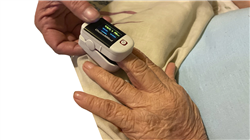University certificate
The world's largest faculty of medicine”
Introduction to the Program
Thanks to this Postgraduate certificate supported by Relearning, you will develop competences to offer efficient emotional support to family members facing a terminal illness and the subsequent bereavement process"

Families of patients in Palliative Care face a series of challenges and responsibilities that generate a considerable physical, emotional and psychological burden on them. This ranges from managing the patient's medical care or practical needs to dealing with emotions such as anxiety, sadness and stress. For these reasons, clinicians must develop effective strategies to provide emotional support to family members to alleviate this burden. In this way, they will help people to face these difficult periods with greater resilience and dignity.
In this context, TECH is developing an innovative and comprehensive program in Family and Bereavement Support in Palliative Care. The study plan will focus on the importance of Psycho-Oncology in the medical setting to assess the emotional needs of families and provide them with strategies to manage the stress caused by the disease. In addition, it will delve into the grieving process, highlighting the most common symptoms and offering guidelines to provide effective psychological counseling. On the other hand, the didactic contents will explore aspects such as the situation of the last days of life, Palliative Sedation or the Euthanasia procedure. In this way, the graduates will obtain competencies to apply effective bereavement interventions and provide other support resources to help families process the loss of their loved one.
This university program is taught 100% online, giving specialists the flexibility to adapt to their schedules. In addition, the Relearning system, based on the repetition of key concepts to fix the knowledge, will facilitate an effective and rigorous updating. On the other hand, the most disruptive contents of this medical field will also be addressed in an exclusive Masterclass, given by an International Guest Director of great prestige.
With the Masterclass of this program, taught by a renowned international expert in Palliative Care, you will be able to update all your clinical skills"
This Postgraduate certificate in Family and Bereavement Support in Palliative Care contains the most complete and up-to-date scientific program on the market. The most important features include:
- Practical cases presented by experts in Palliative Care
- The graphic, schematic and eminently practical contents with which it is conceived gather scientific and practical information on those disciplines that are indispensable for professional practice
- Practical exercises where self-assessment can be used to improve learning
- Its special emphasis on innovative methodologies
- Theoretical lessons, questions to the expert, debate forums on controversial topics, and individual reflection assignments
- Content that is accessible from any fixed or portable device with an Internet connection
You will delve into the optimal approach to Refractory Symptoms, helping family members to manage their emotional distress after the loss of a loved one”
The program’s teaching staff includes professionals from the sector who contribute their work experience to this specializing program, as well as renowned specialists from leading societies and prestigious universities.
The multimedia content, developed with the latest educational technology, will provide the professional with situated and contextual learning, i.e., a simulated environment that will provide immersive education programmed to learn in real situations.
This program is designed around Problem-Based Learning, whereby the professional must try to solve the different professional practice situations that arise during the course. For this purpose, students will be assisted by an innovative interactive video system created by renowned and experienced experts.
You will design and implement effective strategies to help families cope with the grieving process and provide them with high quality psychological support"

You will strengthen your communication skills, which will allow you to establish empathetic and effective interactions with the family nucleus of patients in Palliative Care"
Why study at TECH?
TECH is the world’s largest online university. With an impressive catalog of more than 14,000 university programs available in 11 languages, it is positioned as a leader in employability, with a 99% job placement rate. In addition, it relies on an enormous faculty of more than 6,000 professors of the highest international renown.

Study at the world's largest online university and guarantee your professional success. The future starts at TECH”
The world’s best online university according to FORBES
The prestigious Forbes magazine, specialized in business and finance, has highlighted TECH as “the world's best online university” This is what they have recently stated in an article in their digital edition in which they echo the success story of this institution, “thanks to the academic offer it provides, the selection of its teaching staff, and an innovative learning method aimed at educating the professionals of the future”
A revolutionary study method, a cutting-edge faculty and a practical focus: the key to TECH's success.
The most complete study plans on the university scene
TECH offers the most complete study plans on the university scene, with syllabuses that cover fundamental concepts and, at the same time, the main scientific advances in their specific scientific areas. In addition, these programs are continuously being updated to guarantee students the academic vanguard and the most in-demand professional skills. In this way, the university's qualifications provide its graduates with a significant advantage to propel their careers to success.
TECH offers the most comprehensive and intensive study plans on the current university scene.
A world-class teaching staff
TECH's teaching staff is made up of more than 6,000 professors with the highest international recognition. Professors, researchers and top executives of multinational companies, including Isaiah Covington, performance coach of the Boston Celtics; Magda Romanska, principal investigator at Harvard MetaLAB; Ignacio Wistumba, chairman of the department of translational molecular pathology at MD Anderson Cancer Center; and D.W. Pine, creative director of TIME magazine, among others.
Internationally renowned experts, specialized in different branches of Health, Technology, Communication and Business, form part of the TECH faculty.
A unique learning method
TECH is the first university to use Relearning in all its programs. It is the best online learning methodology, accredited with international teaching quality certifications, provided by prestigious educational agencies. In addition, this disruptive educational model is complemented with the “Case Method”, thereby setting up a unique online teaching strategy. Innovative teaching resources are also implemented, including detailed videos, infographics and interactive summaries.
TECH combines Relearning and the Case Method in all its university programs to guarantee excellent theoretical and practical learning, studying whenever and wherever you want.
The world's largest online university
TECH is the world’s largest online university. We are the largest educational institution, with the best and widest online educational catalog, one hundred percent online and covering the vast majority of areas of knowledge. We offer a large selection of our own degrees and accredited online undergraduate and postgraduate degrees. In total, more than 14,000 university degrees, in eleven different languages, make us the largest educational largest in the world.
TECH has the world's most extensive catalog of academic and official programs, available in more than 11 languages.
Google Premier Partner
The American technology giant has awarded TECH the Google Google Premier Partner badge. This award, which is only available to 3% of the world's companies, highlights the efficient, flexible and tailored experience that this university provides to students. The recognition as a Google Premier Partner not only accredits the maximum rigor, performance and investment in TECH's digital infrastructures, but also places this university as one of the world's leading technology companies.
Google has positioned TECH in the top 3% of the world's most important technology companies by awarding it its Google Premier Partner badge.
The official online university of the NBA
TECH is the official online university of the NBA. Thanks to our agreement with the biggest league in basketball, we offer our students exclusive university programs, as well as a wide variety of educational resources focused on the business of the league and other areas of the sports industry. Each program is made up of a uniquely designed syllabus and features exceptional guest hosts: professionals with a distinguished sports background who will offer their expertise on the most relevant topics.
TECH has been selected by the NBA, the world's top basketball league, as its official online university.
The top-rated university by its students
Students have positioned TECH as the world's top-rated university on the main review websites, with a highest rating of 4.9 out of 5, obtained from more than 1,000 reviews. These results consolidate TECH as the benchmark university institution at an international level, reflecting the excellence and positive impact of its educational model.” reflecting the excellence and positive impact of its educational model.”
TECH is the world’s top-rated university by its students.
Leaders in employability
TECH has managed to become the leading university in employability. 99% of its students obtain jobs in the academic field they have studied, within one year of completing any of the university's programs. A similar number achieve immediate career enhancement. All this thanks to a study methodology that bases its effectiveness on the acquisition of practical skills, which are absolutely necessary for professional development.
99% of TECH graduates find a job within a year of completing their studies.
Postgraduate Certificate in Family and Bereavement Support in Palliative Care
Discover in TECH Global University the Postgraduate Certificate in Family and Bereavement Support in Palliative Care, a unique opportunity to specialize in emotional support and comprehensive accompaniment to terminally ill patients and their families. With our online classes, you will acquire the knowledge and skills necessary to provide compassionate and effective support during difficult times. Our program is designed for medical professionals and healthcare personnel interested in deepening their knowledge in the area of palliative care and in developing specific competencies for the care of the emotional needs of patients and their loved ones. Through an interactive virtual learning platform, you will have access to up-to-date educational content and practical resources to help you better understand the bereavement process and provide compassionate support.
Gain a deeper understanding of comprehensive end-of-life care
At TECH Global University, we are committed to providing quality education that combines academic rigor with practical application in the professional setting. Therefore, our teaching team is composed of experts in the field of palliative care and bereavement psychology, who will guide and support you in your learning process. Upon successful completion of this course, you will be prepared to face the challenges of accompanying terminally ill patients and their families, providing quality emotional and spiritual support. This qualification will equip you with the skills and knowledge necessary to provide comprehensive and compassionate service in the field of palliative medicine. Take the opportunity to advance your career and make a difference in people's lives with the Postgraduate Certificate in Family and Bereavement Support in Palliative Care offered by TECH Global University. Enroll now and start your path towards a leading specialization in the field of medicine!







